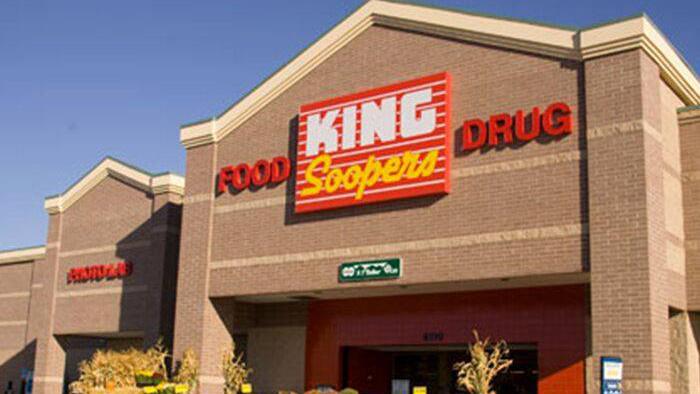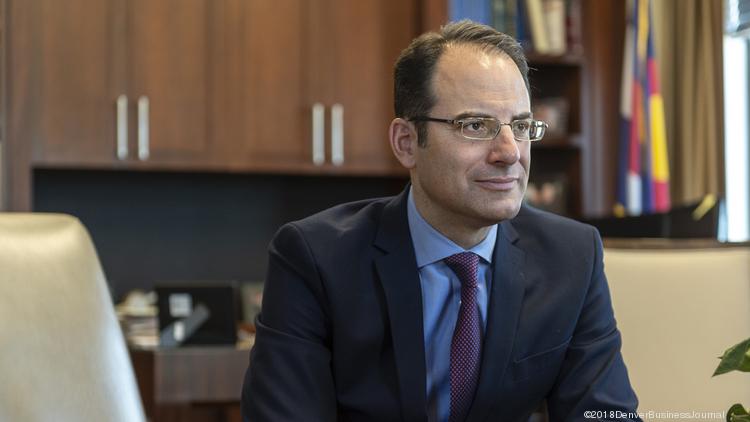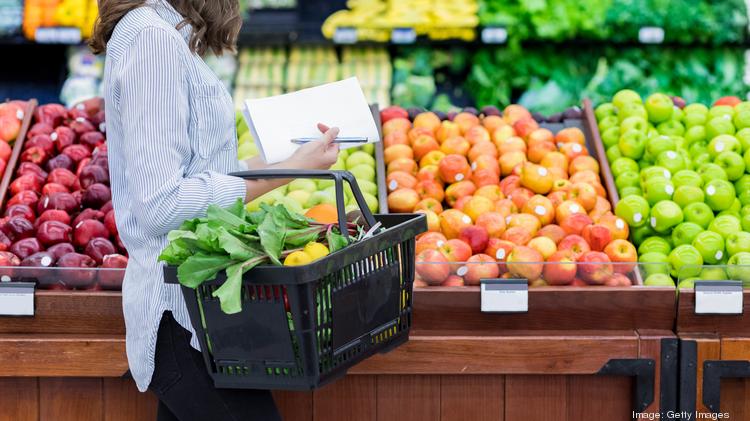U$A MONOPOLY CAPITALI$M
Column: Think food inflation is bad now? Wait till Kroger and Albertsons merge
Michael Hiltzik
Tue, October 18, 2022

A produce clerk at the Ralphs supermarket in La Jolla restocks produce in the store. (Howard Lipin / San Diego Union-Tribune)
The gargantuan proposed $24.6-billion merger of supermarket behemoths Kroger and Albertsons is being touted by the merger partners as a boon to consumers.
“We will take the learnings from each company to bring greater value and a better experience to more customers, more associates and more communities,” Kroger Chief Executive Rodney McMullen told analysts and investors in a conference call Friday after the deal was announced.
McMullen didn't explicitly say that would mean lower prices, but it would be a rare shopper who didn't think that "greater value and a better experience" meant anything other than paying less at the checkout counter.
Column: Think food inflation is bad now? Wait till Kroger and Albertsons merge
Michael Hiltzik
Tue, October 18, 2022

A produce clerk at the Ralphs supermarket in La Jolla restocks produce in the store. (Howard Lipin / San Diego Union-Tribune)
The gargantuan proposed $24.6-billion merger of supermarket behemoths Kroger and Albertsons is being touted by the merger partners as a boon to consumers.
“We will take the learnings from each company to bring greater value and a better experience to more customers, more associates and more communities,” Kroger Chief Executive Rodney McMullen told analysts and investors in a conference call Friday after the deal was announced.
McMullen didn't explicitly say that would mean lower prices, but it would be a rare shopper who didn't think that "greater value and a better experience" meant anything other than paying less at the checkout counter.
There is no reason to allow two of the biggest supermarket chains
in the country to merge — especially with food prices already soaring.Sarah Miller, American Economic Liberties Project
Some analysts said the merger of the largest and second-largest supermarket chains would allow them to compete better with the biggest grocery retailer of all, Walmart, and the rapidly upward-scuttling Amazon, the owner of Whole Foods.
But haven't we heard all this before?
Cable, media and telecommunications companies always promised that their mergers would bring lower prices and more choices for the audience.
When AT&T completed its acquisition of Time Warner in 2018, AT&T CEO Randall Stephenson pledged that the deal would allow the companies to "offer customers a differentiated, high-quality, mobile-first entertainment experience.... We’re going to bring a fresh approach to how the media and entertainment industry works for consumers, content creators, distributors and advertisers.”
Comcast promised that its 2011 merger with NBCUniversal would open the doors to a paradise of free choice at popular prices. The company also promised that it would do nothing like favoring its own content on its own internet networks.
Did any of that happen? Do you feel you're spending less for video and internet and getting more? Me neither.
The same goes for healthcare mergers, which also are always pitched as routes to better technology and lower fees. As I've observed in the past, hospital and health insurance mergers almost always lead to higher costs, lower efficiencies and less innovation. The reason is simple: Mergers reduce competition — and it’s competition that drives down prices and encourages more efficiency and innovation.
Back in 2004, the merger of Woodland Hills-based WellPoint into Indianapolis-based Anthem was to produce immense savings from combining the health insurance companies' computer systems and allowing customers’ medical data to be exploited for their benefit across the new company’s vast reach.
Never mind that WellPoint Chairman and Chief Executive Leonard Schaeffer was in line to pocket $37 million from the deal plus a lump-sum payout of $45 million in accrued pension rights. We’re still waiting for the technological benefits of the WellPoint-Anthem deal to appear after 18 years. But that didn't stop CVS and Aetna from making the same claim when they announced their merger in 2017.
A 2016 study by USC found that the domination of California's hospital market by two big systems that grew by acquisition, Sutter Health and Dignity Health, not only drove up prices everywhere their institutions were located but also allowed even nonaffiliated hospitals to charge more.
All these deals have been more or less waved through by the Federal Trade Commission. It's encouraging that the current FTC and its chair, Lina Khan, are talking and acting much tougher than previous iterations of the agency. But the Albertsons-Kroger deal will be a major challenge.
Kroger is the owner of Food4Less and Ralphs in California, as well as 26 other store brands. Albertsons owns Safeway, Vons, Pavilions and 12 other brands. That's a big marketing landscape to come under a single owner.
"There is no reason to allow two of the biggest supermarket chains in the country to merge — especially with food prices already soaring,” says Sarah Miller, executive director of the American Economic Liberties Project.
“With 60% of grocery sales concentrated among just five national chains, a Kroger-Albertsons deal would squeeze consumers already struggling to afford food, crush workers fighting for fair wages, and destroy independent, community stores," Miller says. "This merger is a cut-and-dry case of monopoly power, and enforcers should block it.”
The possibility exists that the supermarket merger will create yet another oligopoly to go with the monopolistic inputs that have helped push food prices higher, says former Labor Secretary Robert Reich, who now teaches at UC Berkeley.
"At a time when grocery prices are soaring, in part because of monopolies in the food chain, this merger makes no sense," Reich told me by email. "The current food inflation has two sources: (1) Grain prices have been increasing around the world because of grain shortages brought on by the war in Ukraine and climate change. (2) Domestic monopolies in seeds, fertilizer, and food processing have used the cover of inflation to raise their prices higher than their increasing costs — including the costs of agricultural commodities, labor and transportation."
As Reich points out, corporate profit-seeking is a seldom-cited contributor to consumer inflation. Wages have crept higher over the last year, but the increases have trailed inflation, which is why so many workers and their families are feeling the sting of higher prices. Corporate profit margins, however, have rocketed into the stratosphere, outpacing the inflation rate and pulling it higher.
“Firms in the U.S. increased their markups and profits in 2021 at the fastest annual pace since 1955,” economists Mike Konczal and Niko Lusiani of the Roosevelt Institute reported in June.
It's only fair to observe that supermarket companies traditionally earn a much lower profit margin than those in most other industries — Kroger's operating margin last year was 3.5% on sales of $137.9 billion; at Albertsons the figure was 3.4% on sales of $71.9 billion.
McMullen told analysts he would use the estimated $500 million to $1 billion in annual savings created by the proposed merger to lower shelf prices, remodel stores and improve worker wages and benefits.
But the companies said they would also pay a $4-billion special dividend to Albertsons shareholders, so it would seem that shareholders will be getting most of the gains.
It's widely assumed that the companies will have to sell some stores in regions where their merger would otherwise shrink competition. For anyone curious about how that may work out, notwithstanding the promises of the executives who are flogging it via press releases, there's a precedent. It's about as sickening as finding a nest of spiders in your banana bunch. It involves (wait for it...) Albertsons, which in 2014 cut a deal to acquire Safeway for $9.4 billion.
The FTC ordered the companies to divest 168 of the 2,400 stores the merged company would own, mostly in the West. More than 140 were acquired by Haggen Holdings, an 18-store chain in the Pacific Northwest that was owned by a Florida private equity firm.
As it turned out, Haggen was utterly ill-equipped to grow nearly 10-fold overnight. Within months it was laying off workers, and before the year was out it had filed for bankruptcy. Haggen put 100 of the stores back on the block, and 33 of them were bought back by Albertsons — for about one-fifth, on average, of what it had sold them for. The company's winning bid for some stores was $1 each.
When the smoke cleared, a divestiture that the FTC had ordered to preserve competition ended up eliminating all competition in some communities. One place that got a lot of media attention was Baker City, in western Oregon. Baker City had started out with a Safeway and a Haggen, which competed with each other. After the various ownership flips, it still had two stores, but both owned by the same company.
Baker City looks like the future for communities with Kroger and Albertsons stores. They should be prepared for fewer and smaller competitive price cuts, less choice on the shelves, fewer clerks on the floor, a worse experience for shoppers any way you cut it. That's not to say that McMullen's promises might not come to pass, only that experience teaches us that it's not the way to bet.
This story originally appeared in Los Angeles Times.

The King Soopers at 1950 Chestnut place in downtown Denver.
By Greg Avery – Senior Reporter, Denver Business Journal
Oct 17, 2022
The proposed $24.6 billion combination of Kroger and Albertsons grocery chains nationally is already drawing union opposition and scrutiny from Colorado’s attorney general over concern it could harm consumers in the state.
The deal, unveiled Thursday, would combine the companies behind the King Soopers and City Market groceries in Colorado with the company that owns Safeway grocery stores in the state, combining Colorado’s top and third-largest grocery sellers.
Colorado Attorney General Phil Weiser has opened a review of the deal and could seek concessions from the businesses with the aim of protecting grocery shoppers and workers.
“As Colorado’s attorney general, I take very seriously our department’s responsibility to review mergers that threaten Colorado consumers,” Weiser said in a statement Friday. “At a time of rising food prices, the possibility of undue consolidation in the grocery business raises serious concerns particularly since King Soopers and Safeway have a large footprint in Colorado.”

Colorado Attorney General Phil Weiser.
Cincinnati-based Kroger (NYSE: KR) agreed to pay $34.10 per share to Albertson’s (NYSE: ACI) stockholders. Merging would expand Kroger Co. to 4,996 stores nationwide that reach 85 million U.S households and would employ more than 710,000 people.
The deal is expected to close in 2024 but will face tight regulatory scrutiny.
The companies combined have $210 billion in 2021 sales and generated nearly $3.3 billion in profits.
King Soopers and Safeway capture about 46% of the Denver metro-area grocery sales and would, if merged, dwarf the sales of the next-closest competitor, Walmart Supercenters.
In some areas, like the towns of Erie and Windsor, Kroger owning both Safeway and King Soopers could mean a single company owning the communities' only existing grocery stores.
The United Food & Commercial Workers Union Local 7, which represents thousands of Colorado workers employed at Kroger and Safeway stores, has already come out in opposition to the deal.
“The proposed merger of these two grocery giants is devastating for workers and consumers alike and must be stopped,” wrote Kim Cordova, president of UFCW Local 7 and vice president of UFCW international, which is opposing the deal nationally. “This proposed merger of two of the largest grocery companies in the nation will no doubt create a monopoly in the grocery industry for many communities.”
Cordova issued a written statement opposing the deal, as has the union nationally.
Kroger’s King Soopers stores lead grocery sales statewide and corner about 36% of Denver metro-area grocery spending, topping $3.7 billion in annual sales, according to 2021 numbers from the analytics firm Chain Store Guide.
That’s double the market share of second-place Walmart Supercenters and more than double the value of sales.
Coming in third are Albertson’s-owned Safeway stores, which capture 11.5% of the metro-area market and annual sales of just over $1.2 billion, said Chain Store Guide.
>>See the 2022 market shares for the Denver area in the slideshow below
Grocery store market share 2022

Cincinnati-based Kroger (NYSE: KR) agreed to pay $34.10 per share to Albertson’s (NYSE: ACI) stockholders. Merging would expand Kroger Co. to 4,996 stores nationwide that reach 85 million U.S households and would employ more than 710,000 people.
The deal is expected to close in 2024 but will face tight regulatory scrutiny.
The companies combined have $210 billion in 2021 sales and generated nearly $3.3 billion in profits.
King Soopers and Safeway capture about 46% of the Denver metro-area grocery sales and would, if merged, dwarf the sales of the next-closest competitor, Walmart Supercenters.
In some areas, like the towns of Erie and Windsor, Kroger owning both Safeway and King Soopers could mean a single company owning the communities' only existing grocery stores.
The United Food & Commercial Workers Union Local 7, which represents thousands of Colorado workers employed at Kroger and Safeway stores, has already come out in opposition to the deal.
“The proposed merger of these two grocery giants is devastating for workers and consumers alike and must be stopped,” wrote Kim Cordova, president of UFCW Local 7 and vice president of UFCW international, which is opposing the deal nationally. “This proposed merger of two of the largest grocery companies in the nation will no doubt create a monopoly in the grocery industry for many communities.”
Cordova issued a written statement opposing the deal, as has the union nationally.
Kroger’s King Soopers stores lead grocery sales statewide and corner about 36% of Denver metro-area grocery spending, topping $3.7 billion in annual sales, according to 2021 numbers from the analytics firm Chain Store Guide.
That’s double the market share of second-place Walmart Supercenters and more than double the value of sales.
Coming in third are Albertson’s-owned Safeway stores, which capture 11.5% of the metro-area market and annual sales of just over $1.2 billion, said Chain Store Guide.
>>See the 2022 market shares for the Denver area in the slideshow below
Grocery store market share 2022

A look at Denver grocery stores, ranked by their 2022 market shares based on data from national grocery analytics firm Chain Store Guide.
The combined groceries operate more than 250 stores across Colorado, according to 9News.
Kroger and Albertsons’ merger deal anticipates having to divest stores in some markets to win the deal’s approval.
A spin-off company with between 100 and 350 grocery stores nationally is expected to be carved off the Kroger-Albertsons business and owned as an independent grocer by the shareholders of Albertsons after the merger, Kroger’s deal announcement said. The locations of stores that would be spun off have not been determined.
Colorado’s attorney general has won concessions in multibillion-dollar national mergers several times in recent years.
Notably, last year, Weiser was among several state attorneys general and others who opposed the proposed merger of Great American Outdoors Group, which operates five Bass Pro Shops and Cabela’s shops in the state, and Sportsman’s Warehouse, which operates seven stores in Colorado. The outdoor retailers scuttled their merger in December over regulatory opposition.
Prior merger reviews by Weiser’s office resulted in concessions in the merger of United Healthcare and DaVita Medical Group, a physicians’ group subsidiary of the Denver-based kidney-care company, that were designed to protect consumers in the Colorado Springs area.
His office joined other AGs in suing to halt 2019’s T-Mobile-Sprint merger and dropped the opposition after winning a commitment that Douglas County-based Dish Network would establish a 2,000-employee wireless telecommunications company headquarters in the state and T-Mobile build out its 5G network statewide or pay a $100 million penalty.
No comments:
Post a Comment